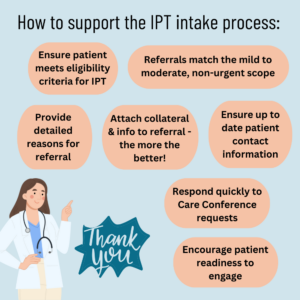Meet the PCN Interprofessional Team (IPT) Intake Coordinators
Ever wonder how referrals to the PCN Interprofessional Team (IPT) get processed? We had the chance to speak with two of our IPT Intake Coordinators recently: Robin Destun from PCN 1 and Nora McKellin from PCN 4. Robin and Nora are part of the dynamic team of coordinators who are taking a deeper look into all the referrals coming in to the IPT.
Each PCN has at least one Intake Coordinator, with the larger PCNs having two. Their mission? To process and assess all incoming referrals for their PCNs, making sure every patient gets appropriate care and support based on their individual needs.
A Patient-Centred Approach
Our Intake Coordinators start with a thorough chart review, scanning their EMR, Paris, and Care Connect. They’re a little like detectives, piecing together each patient’s journey to better understand their needs. Sometimes, they find that patients are already connected to other programs that can serve them better, or that the patient needs a higher level of support than the IPT can provide. This type of review helps get patients to the right care and also helps keep the IPT’s capacity in check.
They also make sure patients meet the IPT’s eligibility criteria. For mental health referrals, they assess risks, look for diagnoses, and check for any history of hospitalization or suicide attempts. If a patient’s needs are beyond the IPT’s mild to moderate scope, they’ll find more suitable support options to bring back to their providers.
During the referral review, our coordinators might need more info. They may need more details on the referral reason, or more info on a patient that seems to have higher acuity. They may want to check in about the patient’s ability/readiness to engage or their cognitive function. That’s when they may need to flex the team-based care muscle and book a Care Conference with the referring provider and gather all the details they need to proceed quickly and efficiently.
If the patient’s care needs fit the IPT, the next step is an intake call with the patient. Both Robin and Nora expressed the importance of the first contact with the patient to set them up for good experiences and manage expectations. Here, they explain the IPT Program, discuss the patient’s goals, and gather more info. Sometimes, this call alone can provide the support a patient needs, thanks to the coordinators’ vast knowledge and experience.
After this intake call, patients whose care needs can be met are scheduled for their first appointment with an IPT clinician. This happens about 80% of the time. If not, the coordinators go on a quest to find other support options, sharing these with the Primary Care Provider. This search can lead to many hours of work researching resources and finding information. One example Nora shared was trying to find suitable supports for a patient who resides in another community outside of Vancouver. Currently, about 20% of referrals are declined, mostly because the patient couldn’t be contacted or their needs were beyond the IPT’s scope.
Strength in Team Diversity
The Intake Coordinators are a diverse group, bringing wisdom and experience from various backgrounds like Home Health and Mental Health & Substance Use. They tap into each other and collaborate with the larger Interprofessional Team and the Clinical Operations Supervisor, as well as in-clinic PCN roles like Registered Nurses and co-located Clinical Pharmacists, not to mention the referring providers, to deliver team-based care.
A Meaningful Role
We asked Nora and Robin what they found most rewarding about their roles. Nora said she enjoyed the team collaboration and the ability to tap into so much wisdom and knowledge on the team. She enjoys helping to make sure a patient doesn’t fall through the cracks, and is also set up for success once they are discharged.
Robin agreed, and said she enjoys being part of a program where the focus is on preventative work and intervening before things get acute. She enjoys having time to consult and speak with providers to support their patients and work collaboratively.
So, now that you know more about all the behind the scenes work that the PCN Intake Coordinators do every day, you may wonder how you can support the referral process. Searching for various resources and information can divert time from processing referrals that our IPT Clinicians can support, potentially increasing wait times. To assist you, here are some key points to keep in mind when referring patients:

If you are interested in knowing more about the IPT services, get in touch with your PCN’s Community Network Manager.






